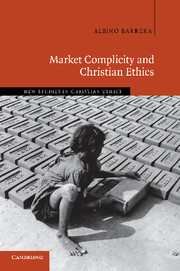Book contents
- Frontmatter
- Contents
- General editor's preface
- Acknowledgments
- Introduction
- PART I THEORY: MATERIAL COOPERATION IN ECONOMIC LIFE
- PART II APPLICATION: A TYPOLOGY OF MARKET-MEDIATED COMPLICITY
- PART III SYNTHESIS AND CONCLUSIONS
- 9 Toward a theology of economic responsibility
- 10 Synthesis: Christian ethics and blameworthy material cooperation
- References
- Index
9 - Toward a theology of economic responsibility
Published online by Cambridge University Press: 16 May 2011
- Frontmatter
- Contents
- General editor's preface
- Acknowledgments
- Introduction
- PART I THEORY: MATERIAL COOPERATION IN ECONOMIC LIFE
- PART II APPLICATION: A TYPOLOGY OF MARKET-MEDIATED COMPLICITY
- PART III SYNTHESIS AND CONCLUSIONS
- 9 Toward a theology of economic responsibility
- 10 Synthesis: Christian ethics and blameworthy material cooperation
- References
- Index
Summary
Economic responsibility is the corollary of economic complicity. After all, the issue of complicity is ultimately a question of responsibility. But why be responsible? Why take responsibility for distant harms whose causes are either ill-defined or unidentified, or both? Why hold oneself to account when the community itself does not hold us legally or morally culpable? Any theological reflection on economic complicity must necessarily articulate a corresponding ethics of economic responsibility. In what follows, we examine the foundations of a theology of responsibility for economic harms using the literature on the nature of responsibility, Sacred Scripture, and the official statements of the various Christian churches on economic justice.
FITTING IN WITHIN THE LITERATURE
Let us begin by clarifying the type of economic responsibility we examine in this chapter. There are at least three types of economic responsibility according to the object of the duty. First, we have the positive obligations, such as our responsibility for helping those who are in need. There is much in both the philosophical and theological literature on this kind of economic responsibility. The second type pertains to stewardship for the gifts that we hold in trust, such as our skills and our possessions. The third deals with negative obligations, such as not hurting others or rectifying the unintended ills that we cause. This last type of economic responsibility is the topic of our study and of this chapter.
- Type
- Chapter
- Information
- Market Complicity and Christian Ethics , pp. 233 - 265Publisher: Cambridge University PressPrint publication year: 2011



